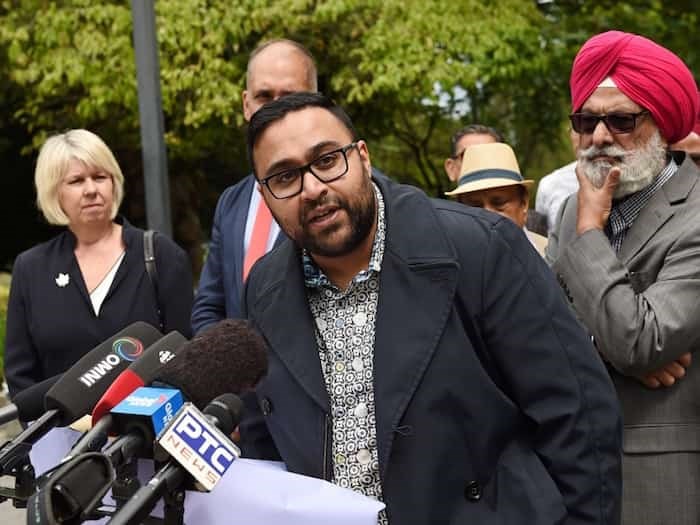 Gulzar Nanda of Hi-Class Jewellers spoke at a news conference Thursday outside city hall to call for the revitalization of the Punjabi Market. Photo Dan Toulgoet
Gulzar Nanda of Hi-Class Jewellers spoke at a news conference Thursday outside city hall to call for the revitalization of the Punjabi Market. Photo Dan Toulgoet
Gulzar Nanda and his mother could have moved the family-run jewellery shop from Main Street to Surrey like many other businesses in the Punjabi Market have done over the years.
But Nanda, 29, wants to keep Hi-Class Jewellers on the same strip on which his father and grandfather started the business 35 years ago after arriving from India.
His father, Mrignesh, died two years ago.
“My dad spent so much time there — more than 30 years —and I didn’t want the market and his legacy to die,” he said, noting he and his mother almost moved the business to Surrey around the time of his father’s death.
“So that’s why I’ve stayed. It’s for the community, but it’s also a way for me to connect with my past, with my history.”
Nanda was one of several speakers Thursday at a news conference outside city hall, where business and community leaders from the South Asian community gathered to celebrate a recent commitment from city council.
That commitment, which came via a successful motion from Green Party Coun. Pete Fry, was to first recognize the historic significance of the market and present day importance to Vancouver.
The motion also directs city staff to review all work to date on plans to revitalize the three-block commercial district along Main Street, between 48th and 51st Avenues.
His father, Mrignesh, died two years ago.
“My dad spent so much time there — more than 30 years —and I didn’t want the market and his legacy to die,” he said, noting he and his mother almost moved the business to Surrey around the time of his father’s death.
“So that’s why I’ve stayed. It’s for the community, but it’s also a way for me to connect with my past, with my history.”
Nanda was one of several speakers Thursday at a news conference outside city hall, where business and community leaders from the South Asian community gathered to celebrate a recent commitment from city council.
That commitment, which came via a successful motion from Green Party Coun. Pete Fry, was to first recognize the historic significance of the market and present day importance to Vancouver.
The motion also directs city staff to review all work to date on plans to revitalize the three-block commercial district along Main Street, between 48th and 51st Avenues.
Ironically, Nanda pointed out, rents were higher in the 1990s in the Punjabi Market than they are now. A 1,000 sq. foot space could cost $5,000 to $10,000 per month to rent, he said.
Today, he knows of an 800 sq. foot space in the market that is being rented for under $2,000 a month. He cited several reasons for that, including lower assessment values, vacancies and fewer customers in 2019.
A comparable place in Surrey would be more than $2,500, he said, and likely require the tenant to enter into a triple-net lease, which means paying for property tax, the lease and maintenance.
“The really high traffic areas [in Surrey] are even more expensive than that,” said Nanda, noting lower rents in the Punjabi Market have attracted some smaller businesses on short-term leases.
“There’s still some vacancies, and we want to be able to work with our partners to increase the use of a small amount of space, and I believe that the City of Vancouver and their city-wide [planning] process is going to include a growth idea for the Punjabi Market.”
Nanda said he recognized governments are limited in what they can do to revitalize an area, but is counting on Fry and council and the provincial and federal governments to work with businesses to keep the market alive.
NPA Coun. Sarah Kirby-Yung, who attended the news conference, pointed to council’s recent decision to give businesses a two per cent tax break as an indication the city is working on retaining businesses in Vancouver.
“That’s not the silver bullet, and we need to do a lot more,” said Kirby-Yung, noting she wants the city to explore whether it has land in the area of the market where it can support new businesses.
Nanda said incorporating co-use work spaces is another idea worth exploring to save costs among businesses. Other speakers stressed the need to better market and revive a business strip that is in the heart of a large South Asian neighbourhood.
“For those who have lived and worked in the area for over the last 50 years, [they] believe the city overlooked the area and made it less attractive to stay in,” said Ajay Puri, a community organizer and consultant, who served as master of ceremonies at the news conference.
“If this displacement and gentrification continues, we feel like we will lose such an important landmark of our city.”
He had a folder with him, showing decisions by previous councils to help the community that never materialized. He also showed a newspaper article from 2008 about building an “India Gate” at the entrance to the market that didn’t happen.
Puri said he believes the current city council is committed to “saving the Punjabi Market” and helping develop a new model on how best to use the assets of the neighbourhood.
“We hope that the Punjabi Market isn’t a museum, filled with artifacts and the past, but an area that is thriving, bustling and inclusive for all to enjoy,” he said.



